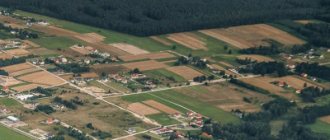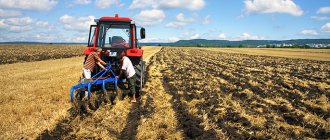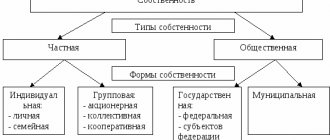Home / Real estate / Land / Categories of land plots
Back
Published: 11/02/2017
Reading time: 7 min
0
573
Gardening and vegetable gardening lands can be used not only for growing agricultural products, but also for the construction of various buildings. You can obtain plots from local governments.
- Lands of populated areas Definition
- Terms of use of sites
The concept of garden and vegetable plots
First you need to decide what kind of land plot and for what purposes the citizen is going to receive it. It is worth considering that different lands will be needed for gardening, vegetable gardening and summer cottage construction.
Thus, a garden plot of land is an allotment that is provided to a person or purchased by him for growing fruit, berries, vegetables and other agricultural crops, as well as for recreation. On such a site it is permitted to erect economic buildings and structures not intended for citizen residence.
It is impossible to register in a building built on a garden plot.
A garden plot of land is also an area intended for growing berries, vegetables and agricultural crops. It can only house auxiliary utility structures that are not used for human habitation.
What can be built on a garden plot
When purchasing a garden plot, citizens would like to build some objects on it. In this regard, they are interested in what can be built on lands for gardening in accordance with domestic legislation.
According to the classifier of types of permitted use of sites, the following outbuildings are allowed to be erected on this territory:
- barn,
- bathhouse,
- greenhouse,
- hangar,
- woodcutter,
- garage,
- street toilet,
- a garden house intended for relaxation and not for living;
- other utility buildings for growing crops.
To build the above objects, you do not need to obtain a construction permit from SNT.
Types of permitted construction
It's time to figure out what is still possible and what is prohibited to build on your land plot.
Gardening
If, according to the classifier for the type of permitted use, your plot is classified as horticultural, then you are allowed to build on this land :
- sheds;
- greenhouses;
- garage;
- outbuildings for storing crops.
You can also build a garden house for relaxation . An important caveat is that it should not serve as a place of permanent residence .
But what if you want to arrange housing away from the noise of the city, and build a full-fledged residential building? In this case, the determining factor is the category of land.
If your land plot is located on agricultural land, then the construction of a residential building for permanent residence with subsequent registration is prohibited .
This problem can be solved by changing the category of the territory on which the site is located. Then you can build a house and provide it with all communications, electricity and water, so that this house is recognized as a residential premises .
Changing the status of a house from “non-residential” to “residential” is simple. To do this, it is enough to submit a corresponding application to the local administration. At the same time, formally the current legislation is not violated - after all, when the category is changed, the gardening plot will already be within the boundaries of the ZNP.
It should be noted here that, unlike changing the status of a house, changing the category of land is a very difficult matter, and sometimes even impossible .
Horticulture
As for the plots allocated for gardening, everything is simple here. As already mentioned, the following buildings can be erected :
- sheds for storing agricultural implements and summer furniture;
- storage room for harvested crops;
- greenhouse;
- bathhouse, toilet;
- other auxiliary and household structures.
it is prohibited to build a residential building on this site . This ban applies regardless of whether the garden plot is located within the boundaries of a populated area or on agricultural land.
Unlike changing the category of land, changing the status of a plot from “gardening” to “gardening” or “LPH - personal subsidiary plot” is possible, but this procedure is quite lengthy and requires patience, time and expense from the landowner.
What is meant by individual gardening?
In accordance with Russian legislation, citizens of the Russian Federation have the right to engage in gardening, horticulture or dacha farming on an individual basis. Such activities can be carried out either in a separate place or in a village where there is a gardening non-profit partnership.
In essence, individual gardening on the lands of populated areas is the practice of gardening by a person who is not a member of the SNT.
Joining the ranks of members of the partnership, as well as leaving it, is the right of every citizen.
When engaged in such activities individually, a person can use the association’s utility networks, roads and other public property.
What areas can be used for gardening and vegetable gardening?
The category of land for gardening has not been established. In this regard, agricultural land with a high bonitet index - the level of soil quality - is usually used for gardening.
Of course, most often such plots can be found outside the city, in environmentally friendly conditions. This is explained by the fact that, according to their characteristics, they are more suitable for growing certain crops.
The lands of settlements and settlements are usually provided to citizens for other purposes, for example, for individual residential development. Although there may be exceptions.
Horticultural plots can be exploited either as a property or as a lease.
Terms of land use
When purchasing a garden plot, a citizen must take into account the main condition of its use, observing the intended purpose of the land.
A person has the right to receive an allotment not only under a contract of sale, lease or inheritance, but also from local authorities on the basis of indefinite or lifelong use.
Any citizen can purchase land for gardening or vegetable gardening by becoming a member of the SNT.
How can the site be used?
One of the most common questions that worries citizens when purchasing this type of plot, if the plot is for gardening, is it possible to build a residential building on it. As noted earlier, this is what distinguishes a garden or vegetable plot of land from a country plot. Houses and other structures suitable for human habitation cannot be built on it.
On garden lands it is allowed to build holiday houses, which are permanent buildings. However, the legislation does not provide for the possibility of registering at such an address.
It is worth noting that the lands of populated areas for gardening have restrictions on the size of buildings that are allowed to be built on them. Thus, the volume of development should not exceed 25 percent of the total area of the plot.
At the same time, at least part of the land must be used for its intended purpose.
Land allocation procedure
According to land legislation, every citizen of the Russian Federation has the right to receive a plot of land that is in state or municipal ownership. Land for vegetable gardening or horticulture can become the property of an individual or a non-profit association if it is registered with local authorities for this purpose.
The priority is determined on the basis of submitted applications.
If applicants have any benefits that give them a preferential right to receive a land plot, they are included in a separate list.
The authorized bodies, having determined the applicants' need for an allotment, taking into account the zoning schemes of the territory, offer one or another type of land or decide to refuse to issue it.
The plot is provided as a property or on the basis of other property rights.
In accordance with the procedure established by law, a fee is charged for the transfer of land into ownership, which cannot be higher than the standard price of the plot. In other cases, no payment is provided.
Restrictions on the use of plots for gardening and vegetable gardening
The permitted use of land for gardening and vegetable farming has some restrictions regarding:
- type of construction. It should not be intended for permanent residence;
- type of land. As a rule, this applies to agricultural areas, but this may also include settlement lands;
- the size of a permanent structure - no more than 25% of the total size of the site;
- use of at least part of the plot for its intended purpose, for example, for growing crops.
Rights of an individual gardener under the new law on gardening
On January 01, 2021, a new law comes into force - the Federal Law “On the conduct of gardening and vegetable gardening by citizens for their own needs and on amendments to certain legislative acts of the Russian Federation.”
The new law, in contrast to the Federal Law of April 15, 1998 No. 66-FZ “On gardening, gardening and dacha non-profit associations of citizens,” has significantly changed the regulation of gardening and vegetable gardening on an individual basis.
If previously only one article 8 of Law No. 66-FZ was devoted to individual gardeners, and everything else had to be negotiated or went to court, now the rights of individual gardeners are spelled out in more detail in the new law.
If a gardener is a member of a partnership and is still wondering whether it makes sense to leave the membership and what the consequences will be in connection with leaving, then you need to study everything that the new law provides for individual gardeners.
Gardening or vegetable gardening on garden land plots or vegetable plots located within the boundaries of the gardening or vegetable gardening territory, without participation in the partnership, can be carried out by the owners or legal holders of garden or vegetable plots who are not members of the partnership.
The specified persons have the right to use common property located within the boundaries of the gardening or truck farming territory, on equal terms and to the extent established for members of the partnership.
According to the new law, citizens gardening individually are required to pay the following fee:
– payment for the acquisition, creation, maintenance of public property,
– current and major repairs of capital construction projects related to public property and located within the boundaries of the horticulture or market gardening territory,
– for the services and work of the partnership in managing such property, in the manner established for the payment of contributions by members of the partnership.
The total annual fee for citizens gardening individually, according to the new law, is set in an amount equal to the total annual amount of target and membership fees of a member of the partnership, calculated in accordance with the Federal Law and the charter of the partnership.
If an individual gardener fails to pay fees for the use and maintenance of the property, this fee is collected by the partnership in court.
In addition to the responsibilities for individual gardeners, the new law gives them additional rights.
Thus, citizens who garden individually from January 1, 2021 will have the right to take part in the general meeting of members of the partnership.
On the following issues, citizens who garden individually will be able to take part in voting at the general meeting of members of the partnership:
- Making a decision on the acquisition by the partnership of land plots that are in state or municipal ownership, on taking the necessary actions for the acquisition of these land plots;
- Making a decision on the creation (construction, reconstruction) or acquisition of public property, including public land plots, and on the procedure for its use;
- Making a decision on the transfer of public real estate into the common shared ownership of the owners of land plots located within the boundaries of the territory of gardening or truck farming, into the state ownership of a constituent entity of the Russian Federation or into the ownership of a municipal entity within the boundaries of which the territory of gardening or truck farming is located;
- Determining the amount and deadline for making contributions, the procedure for spending targeted contributions, as well as the amount and deadline for making fees;
- Approval of the financial and economic justification for the amount of contributions, financial and economic justification for the amount of fees.
On other issues on the agenda of the general meeting of members of the partnership, persons engaged in gardening individually do not take part in voting when making decisions by the general meeting of members of the partnership.
In addition, citizens who have land plots on the territory of a gardening partnership, but are not its members, will have the right to appeal decisions of the partnership bodies that entail civil consequences for these persons, in cases and in the manner provided for by the new federal law.
Citizens who garden individually, according to the new law, have the right to familiarize themselves with and, upon application, receive, for a fee, the amount of which is established by a decision of the general meeting of members of the partnership, certified copies of:
1) the charter of the partnership as amended, a document confirming the fact of making an entry in the unified state register of legal entities;
2) accounting (financial) statements of the partnership, income and expense estimates of the partnership, reports on the implementation of such estimates, audit reports (in the case of audits);
3) conclusions of the audit commission (auditor) of the partnership;
4) documents confirming the partnership’s rights to property reflected on its balance sheet;
5) minutes of the meeting on the establishment of the partnership, minutes of general meetings of members of the partnership, meetings of the board of the partnership and the audit commission of the partnership;
6) financial and economic justification for the amount of contributions;
7) other internal documents of the partnership provided for by this Federal Law, the charter of the partnership and decisions of the general meeting of members of the partnership.
Lawyer Zhmurko Svetlana Evgenievna
Make an appointment for a consultation with a lawyer by phone: 8(985)998-58-08
Gardening and dacha associations
- Minutes of the general meeting of SNT: how to get it if the chairman does not issue
Permalink
- The owner of a plot in a cottage community will not pay for infrastructure: a new decision of the Supreme Court
Permalink
- Is it necessary to survey the area, violations during surveying, neighbors did not agree on the boundary: I answer questions
Permalink
- Leave SNT members in one of two sections so that contributions are lower
Permalink
- How to re-elect the chairman of SNT
Permalink
Latest publications in the press (All publications)
New laws for gardeners: the most important changes for the 2021 summer season
TVNZ
The neighbor's dacha is abandoned and overgrown with weeds: how to register it for yourself
TVNZ
Can an apartment be taken away from the owner?
TVNZ
Why do they want to extend the dacha amnesty for another five years?
TVNZ
“New settlers have become insolent”: deputies demand to protect developers from consumer extremism
TVNZ










